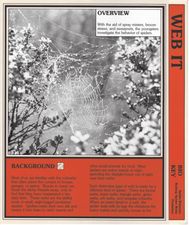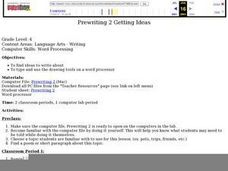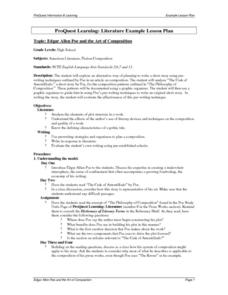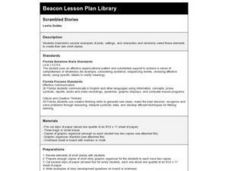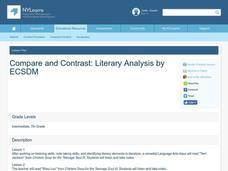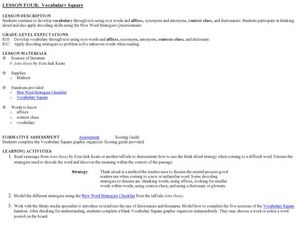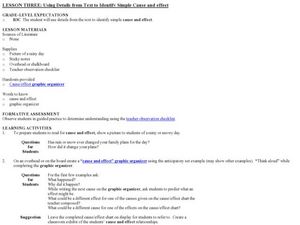Curated OER
Build Mastery: Main Idea
Use a graphic organizer to get readers thinking about main ideas as they record the who, what, where, when, and why of a story. Consider modeling this process completely before kids do this independently. They fill in five boxes charting...
Curated OER
Web It!
Looking for a way to bring prewriting into your informative writing unit? Use this lesson to reinforce writing skills in your eighth grade language arts class. Young writers use a web graphic organizer as a prewriting tool for expository...
Curated OER
The Human Body - Five Types of Human Cells
High schoolers complete a chart/graphic organizer based on the reading passage and locate specific information within the reading passage to complete the Human Body Cells Chart. They then utilize the Human Body Cells Chart to complete...
Curated OER
Build Mastery: Cause and Effect
After you've begun identifying the cause and effect relationship within literature, it's time to give scholars some independent practice. Review the concept before handing out this graphic organizer. Learners use the book they are...
Curated OER
Writing Process
Introduce primary graders to the writing process. After reviewing the steps, they practice using the process by writing a book report. Before writing the draft, they complete a graphic organizer. The completed draft is reviewed by peers....
Curated OER
Literature Circles
Students view a PowerPoint presentation in order to show the five jobs involved in a literature circle. The literature circle is to be used in the class for the reading of novels. A graphic organizer is also used to increase comprehension.
Curated OER
Using Details From The Text
Begin this expository writing activity by reading a non-fiction book of your choice and modeling expository writing. The plan suggests The Trip of a Drip by Vicki Cobb but notes that other texts will work. Learners then choose a...
Curated OER
Why Do Authors Write?
Sixth graders use short reading passages to identify, explain, and discuss the author's purpose for writing. After a lecture/demo, they utilize a graphic organizer embedded in this plan to organize their writing ideas.
Curated OER
Prewriting 2 Getting Ideas
Fourth graders read a poem or short paragraph and have students picture it in their minds. They relate the topic to something in their experience and illustrate, 4th graders generate questions with a graphic organizer, use Prewriting2...
Curated OER
Writing Fables
Pupils develop a working skill of using graphic organizers for writing. The lesson notes that the best kind of organizer is one that is engaging to the appropriate audience. The assessment follows the rubric given in the lesson.
Curated OER
Map Skills
Do you need to practice map skills? Children with a range of abilities will complete a KWL chart about maps, practice important map vocabulary and then read a few pages from their textbook. They will use their vocabulary words and...
Curated OER
Edgar Allen Poe And The Art Of Composition
High schoolers evaluate several works by Edgar Allen Poe based on the criteria in his essay, "The Philosophy of Composotion" Their analysis is documented using a graphic organizer. Learners begin the pre-writing process for their own...
Curated OER
Scrambled Stories
Character development, setting, and plot? Sounds like the makings of a good narrative story. Young authors read and analyze several narrative examples, and then they use what they know to pen an original composition. They work both in...
Curated OER
Reader Response
Fifth graders reflect upon different concepts of Language Arts while reading literature. In the novel Tuck Everlasting, by Natalie Babbitt, the characters discover a spring of eternal youth. After reading the first several chapters of...
Curated OER
Responses to Literature
Middle and high schoolers hone their writing skills by reading Rikki-Tikki-Tavi and the poem Sarah Cynthia Sylvia Stout Would Not Take the Garbage Out. They fill out a graphic organizer (included here), and use the organizer to write an...
Curated OER
Compare and Contrast: Literary Analysis
Seventh graders are able to use active listening skills, take notes and identify literary elements of a short story. They use/create graphic organizer, compare/contrast literary elements from various stories and compare and contrast traits.
Curated OER
Find Figurative Language
Meet with the school library specialist and work together to plan a visit and presentation on figurative language. After defining and examining examples of targeted terms, the class travels to the library where the SL has collected...
Curated OER
Entrepreneurship
Give your class a copy of USA TOday to read through and find articles about companies that offer goods or services. They create a graphic organizer and list the business, product, want or need fulfilled of the companies found in the USA...
Curated OER
A Lesson in Vocabulary with El Bronx Remembered
After reading El Bronx Remembered by Nicholasa Mohr, learners complete a KWL graphic organizer based on vocabulary from the novella. A SMARTboard presentation is a good resource for reviewing the vocabulary, as well as the triple-entry...
Curated OER
Writing Process- Narrative Writing
Graphic organizers are a wonderful tool for young writers to use to help them get their thoughts in order for a piece of writing. Here, learners are coached on what a piece of narrative writing is, and how they must have a distinct...
Curated OER
Compare and Chart the Stories
Elementary schoolers engage in a literature study. They make comparisons of two different versions of a story using a graphic organizer. Using the text and pictures elementary schoolers investigate three elements from the story. Then,...
Curated OER
Vocabulary Square
Examine the use of vocabulary squares to aid in reading comprehension. Assessment and graphic organizer included.
Curated OER
Exploring Figurative Language in Fiction and Nonfiction
A reading of Pat Street's There's a Frog in My Throat launches a study of figurative language. Using a pocket chart, display one phrase containing figurative language. Class members choose the best explanation from three...
Curated OER
Lesson Three: Using Details from Text to Identify Simple Cause and Effect
Third graders identify cause and effect. In this cause and effect lesson, 3rd graders use a graphic organizer to predict effects for certain causes. They read a non-fiction text and put sticky notes marking causes and effects.

